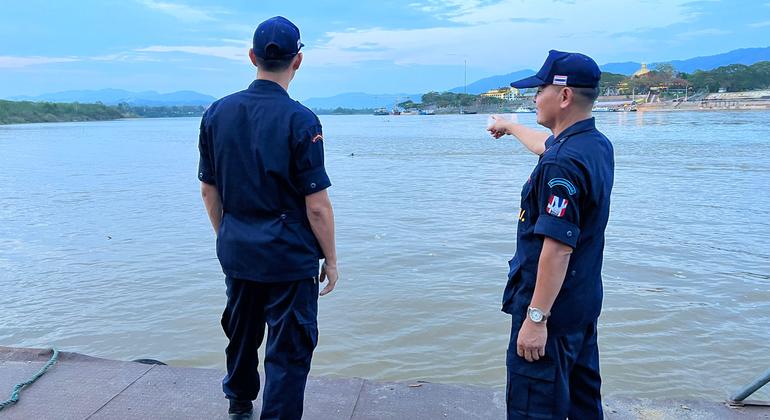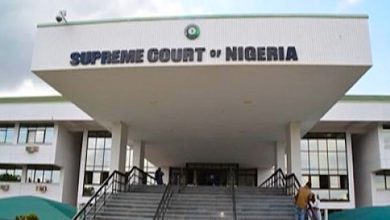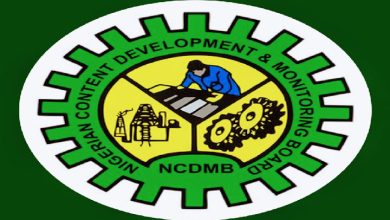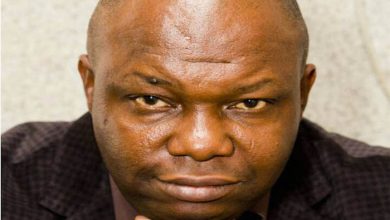Discussion: Focusing on transnational trafficking in Southeast Asia from the grass roots

The agency has been working with village security units in provinces in Thailand as part of its border management program.
The UNODC said the supply of synthetic drugs through the region “is at extreme levels.”
UN News spoke to UNODC’s Regional Representative, Jeremy Douglas, and Eakkachai Suphan, a village security volunteer in the village of Sop Ruak in Thailand, which is located in the Golden Triangle, where the borders of Thailand, Laos and Myanmar meet.
Jeremy Douglas: The production and trafficking of synthetic drugs, including crystal meth and methamphetamine, by international organized crime groups has increased dramatically over the past decade. This region is one of the largest drug trafficking corridors in the world supplying products across Southeast Asia. These synthetic drugs have replaced heroin which was for decades the main illicit drug sold in the golden corner.
UNODC has been working with law enforcement agencies and local volunteer security units to prevent drug trafficking as well as human trafficking and the illegal trade in goods and weapons.
Eakkachai Suphan: I have been a member of the Sop Ruak village security department for about three years. I am part of a group of 37 men who act as part-time volunteers to support and complement the work of law enforcement agencies operating here in the Golden Triangle. I like to help my village and community; I do this work because I want to protect our children who may be involved in taking drugs or being involved in other ways.
Jeremy Douglas: The Mekong River runs along the border between Thailand, Laos, and Myanmar for 1,000 kilometers and it is very difficult to monitor and patrol what is, in fact, a very remote and porous border. Local knowledge of the people living in this part of Thailand and the relationships they may have with people in Laos or Myanmar are important for gathering both information about the drug trade but also to understand the needs of the people involved. Therefore, these village security units play an important role at the grass roots level.
Eakkachai Suphan is a village security volunteer in the village of Sop Ruak in northern Thailand.
Eakkachai Suphan: I work two or three times a week, as needed, sometimes at night and sometimes in daylight hours, according to the knowledge we have gathered. I regularly walk from the Ruak River, which borders Myanmar and south along the Mekong River to a new migration route on the opposite bank to Laos.
I am very happy when I have the opportunity to join the operations with the Border Police and we have had some success in seizing drugs in this area from traders who use boats to transport illegal goods. It was exciting to confiscate a large amount of drugs.
Jeremy Douglas: National organized crime groups anticipate, adapt and try to circumvent what governments are doing, and in 2022 we see them operating around the Thai borders in the Golden Triangle more than ever before. Despite this, the authorities in Thailand and Laos have been very successful in seizing the drugs. I visited Houay Xai on the Lao side of the Mekong where government officials the previous night had caught traffickers with 500 kilos of crystal meth. Last month they seized 7.1 million methamphetamine pills. In Thailand, a river guard recently caught smugglers with 6.4 million methamphetamine pills. Despite these positive developments, it is estimated that several million more drugs and thousands of kilograms of crystal meth are being smuggled and trafficked to lucrative markets across Southeast Asia.
Jeremy Douglas, UNODC Regional Representative for Southeast Asia and the Pacific, in the Golden Triangle in Thailand.
Eakkachai Suphan: I don’t worry about my safety because we cooperate closely with other law enforcement agencies, including security agencies, police, army and river team. I think that if all law enforcement agencies and local police cooperate, then we can win the war against trafficking. I think my community is safer because of the work we do.
Jeremy Douglas: Village security units assist law enforcement officers in monitoring suspicious activities along the river border and report illegal activity to the appropriate authorities. They are part of a network of companies which share information not only nationally but also with neighboring countries. UNODC has used its regional presence and excellent working relationships with governments in Southeast Asia to support the expansion of border offices or BLOs under its border management system.
A Thai border official watches Myanmar across the border between the two countries.
There are 120 BLOs from Myanmar in the west to China in the east and Indonesia to the south and Thailand, Laos, Cambodia, and Viet Nam. They enable countries in the region to work more effectively to combat illegal trafficking as they can share information more quickly and take action together, for example, joint ventures.
It is an effective way to speed up action that States can take to push back on traffickers and on organized criminal networks.
Criminal groups from all over the region are also starting to move and consolidate after the long pandemic border closures, with the end of 2022 and the beginning of 2023 starting to look like 2019.
Fast facts on community volunteer units (CVUs)
- The CVUs patrol the area in public to prevent terrorists crossing into Thailand, while police and military personnel carry out secret operations that lead to the arrest of suspects.
- CCU officers perform other community policing duties.
- Employees respond to emergency situations.
- Units support search and rescue operations.







